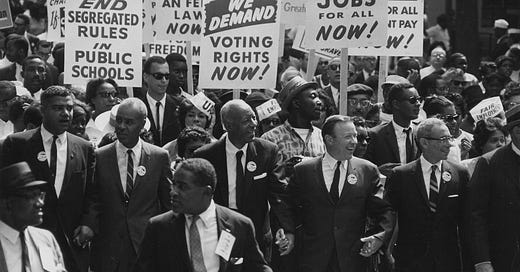Ten great overlooked books about the civil rights movement
You've read Garrow and Branch and Greenberg. You aren't done.
March on Washington, August 1963.
At this unhappy moment in American history, we can benefit from remembering there have been other times of struggle. I’m always inspired by how the civil rights movement, from grass-roots activists to top-level strategists, managed to change the country so much in just over a decade. In fact, a lot of what we are seeing today is a reaction against the democratization the movement achieved from 1954 to 1965.
There are many well-known works on the civil rights movement, such as the classics by David Garrow and Taylor Branch, and David Greenberg’s well-received recent biography of John Lewis. And there are good accounts of various organizations and campaigns. But there are also a few books that should be more widely read, many with a focus on the Movement at the local level. Here is a list of ten works that moved me while I was researching my own book, Waging A Good War: A Military History of the Civil Rights Movement, 1954-1968.
Anthony Siracusa, Nonviolence Before King: The Politics of Being and the Black Freedom Struggle.University of North Carolina Press, 2021.
About the pre-1950s roots of the Civil Rights Movement.
Raymond Arsenault, Freedom Riders: 1961 and the Struggle for Racial Justice. Oxford University Press, 2007.
A well-told recounting of an important episode in the Movement’s history. The early Freedom Riders believed they might be killed in Alabama and Mississippi, perhaps even burned alive in the buses they rode. They came close to suffering that fate. In my book I compare the Freedom Rides to the Doolittle Raid on Tokyo in the spring of 1942. Both were bold long-range raids behind enemy lines designed to disconcert the foe.
William Doyle, An American Insurrection: James Meredith and the Battle of Oxford, Mississippi, 1962. Anchor, 2003.
An intense examination of one of the odder episodes of the Civil Rights era.
Freeman Hrabowski III, Holding Fast to Dreams: Empowering Youth from the Civil Rights Crusade to STEM Achievement. Beacon Press, 2015.
A lovely memoir by someone who marched in Birmingham in 1963 as a twelve-year-old, only to have police and fire superintendent “Bull” Connor spit in his face. Hrabowski, who despite his Polish surname is Black, rose to become an innovative and effective university president.
John Dittmer, Local People: The Struggle for Civil Rights in Mississippi. University of Illinois Press, 1995.
A different and important account that examines the grassroots level of the Movement.
Charles Marsh, God’s Long Summer: Stories of Faith and Civil Rights. Princeton University Press, 1999.
Looks at the Movement through the perspective of the religious views of its leaders, and also those of their segregationist and white supremacist foes.
Michael Honey, Going Down Jericho Road: The Memphis Strike, Martin Luther King’s Last Campaign. W. W. Norton, 2007.
A labor historian’s empathetic account of King’s final campaign.
Andrew Manis, A Fire You Can’t Put Out: The Civil Rights Life of Birmingham’s Reverend Fred Shuttlesworth. University of Alabama Press, 2002.
A good portrait of an extraordinary figure who should be better known. Fred Shuttlesworth, a tough, irascible minister in Birmingham, was a genuine American hero.
Kay Mills, This Little Light of Mine: The Life of Fannie Lou Hamer. University Press of Kentucky, 2007.
Likewise, someone I’d like to see honored on American currency.
Erica Chenoweth, Civil Resistance: What Everyone Needs to Know. Oxford University Press, 2021.
Not really about the civil rights movement, but brimming with observations that illuminate it. I was struck by her point that authoritarian governments often are weaker than they appear to be.






What do you have to do to get a comment around here
May I also suggest Thomas J Sugrue’s “The Origins of the urban crisis: race and inequality in post war Detroit?”